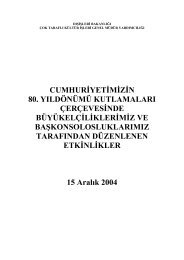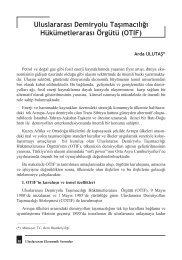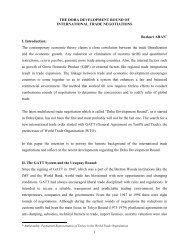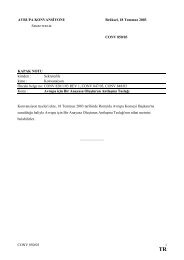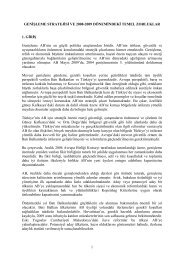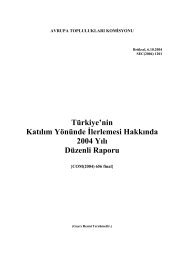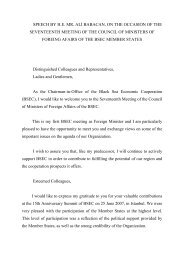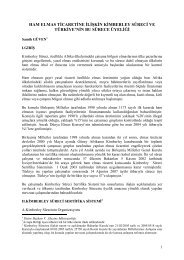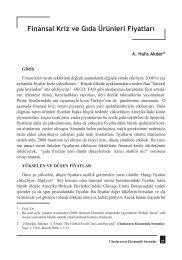CYPRUS ISSUE
CYPRUS ISSUE
CYPRUS ISSUE
Create successful ePaper yourself
Turn your PDF publications into a flip-book with our unique Google optimized e-Paper software.
<strong>CYPRUS</strong> <strong>ISSUE</strong><br />
HISTORICAL AND ACTUAL FACTS
<strong>CYPRUS</strong> THROUGHOUT<br />
HISTORY<br />
Rulers of the Island:<br />
Assyrians, Egyptians, Persians, Romans,<br />
Arabs, Crusaders, Venetians<br />
Ottoman Empire, from 1571 until 1878.<br />
British rule under Ottoman sovereignty in<br />
1878
AFTER 1878<br />
Formal annexation of Cyprus by Britain in 1914<br />
(not recognised by the Ottoman Empire)<br />
high tide of Greek nationalistic ambitions.<br />
1923 – Lausanne Treaty<br />
transfer of sovereignty by Turkey to the UK,<br />
British colony
CYPRIOTS<br />
Never a single “Cypriot Nation”<br />
Two ethnic peoples with distinct national, religious<br />
and cultural characteristics who speak different<br />
languages.<br />
Lived together for centuries but no inter-marriages<br />
and no single commercial partnership was set up.
ENOSIS/Annexation of Cyprus by Greece<br />
Greek and Greek Cypriot agitation for “Enosis”<br />
beginning from 1931 in order to Hellenize the entire<br />
population of the Island and realize union with<br />
Greece.<br />
Referandum for Enosis on 15 January 1950, held by<br />
the Greek Cypriot Orthodox Church (98% in favour)
Terrorist organization EOKA was formed by the<br />
Greek Colonel Grivas, under the guidance of<br />
Archbishop Makarios.<br />
Violent campaign in 1955. EOKA murdered everyone<br />
in their way, the British the Turkish Cypriots and even<br />
some of their kinsman
British decolonisation of the Island<br />
Greece decided to take the issue to the UN / demand for self-determination –<br />
1954<br />
Turkey as being sovereign until the Lausanne Treaty demanded either the return<br />
of the Island to Turkey or division of the Island between Greece and Turkey<br />
Turkish Cypriots demanded their rightful share of Cyprus and resisted to Greek<br />
Cypriot ambitions<br />
19 December 1956 the Colonial Secretary, Alan Lennox-Boyd,<br />
"it will be the purpose of Her Majesty's Government to ensure that any exercise of selfdetermination<br />
should be effected in such a manner that the Turkish Cypriot community,<br />
no less than the Greek Cypriot community, shall in the special circumstances of Cyprus<br />
be given freedom to decide for themselves their future status."<br />
Another alternative emerged as the establishment of two separate states
NEGOTIATIONS FOR A<br />
PARTNERSHIP IN <strong>CYPRUS</strong><br />
Zurich Agreement 11 February 1959<br />
London Agreement 19 February 1959<br />
(signed by the Foreign Ministers of Turkey, Greece and Britian and the leaders<br />
of the two communities Dr. Fazıl Kutchuk (Küçük ) and Archbishop<br />
Makarios)
NEW PARTNERSHIP STATE<br />
Agreed by way of compromise between all five<br />
participants; Britain, Greece, Turkey, the Turkish<br />
Cypriots, and the Greek Cypriots that;<br />
(Turkey, as being the transferor country according to the Lausanne<br />
Treaty became a party of the Agreements)<br />
“new state would be a bi-communal partnership<br />
State with a single international identity, but a<br />
unique Constitution which embodied an agreed<br />
political partnership between Greek and Turkish<br />
Cypriots, and which prohibited the political or<br />
economic union of Cyprus with any other state.
THE 1960 REPUBLIC OF <strong>CYPRUS</strong><br />
16 August 1960<br />
Treaty of Establishment Treaty of Guarantee Treaty of Alliance<br />
"sui generis" settlement.<br />
Bi-communal partnership state<br />
Political equality (co-founders) of the two sides<br />
Joint presence of Turkish and Greek Cypriots in<br />
all organs of the State<br />
Balance between Turkey and Greece<br />
Sovereignty of Cyprus limited by the guarantor<br />
rights given to Turkey, Greece and the UK.
1960 Republic of Cyprus<br />
Not a unitary state / Bi-national state<br />
Majority and minority did not effect the<br />
political equality of the two communities<br />
each existing as a political entity.
The 1960 Republic<br />
Agreed terms of cooperation and partnership,<br />
Shared the legislative, executive, judicial and other functions.<br />
The President was to be a Greek Cypriot while the Vice-President a Turkish Cypriot<br />
Legislative authority shall be vested in a House of Representatives elected by universal<br />
suffrage of each community separately in the proportion of 70 % for the Greek community<br />
and 30 % for the Turkish community<br />
Matters which the two peoples had managed on a Communal basis<br />
over the centuries - like education, religion, family law, etc.- were left to<br />
the autonomy of the Communal administrations with legislative,<br />
executive, and judicial authority.<br />
A "functional federative system“<br />
The right to intervene was given to Turkey, Greece and Britian for the<br />
restoration of the status of Cyprus in case of any change or<br />
disturbance. (Treaty of Guarantee)
Short History Of The Republic<br />
Greek Cypriots did not intend to abide by the Constitution<br />
Archbishop Makarios,<br />
President of the Republic<br />
of Cyprus in 1960<br />
“The agreements do not form the goal -they are the present and not the<br />
future. The Greek Cypriot people will continue their national cause and<br />
shape their future in accordance with their will.” (28th July 1960)<br />
"Until this Turkish community forming part of the Turkish race which<br />
has been the terrible enemy of Hellenism is expelled, the duty of the<br />
heroes of EOKA can never be considered terminated.”<br />
(4th September 1962)
The 1960 Constitution provided that separate municipalities be<br />
established for Turkish Cypriots and Greek Cypriots. The Greek<br />
Cypriots refused to obey this mandatory provision.<br />
The Turkish Cypriots took the matter to the Supreme Constitutional<br />
Court of Cyprus. The court comprised one Greek Cypriot judge, one<br />
Turkish Cypriot judge, and a neutral President.<br />
On 25th April 1963 the Court did rule against the Greek Cypriots,<br />
however it was ignored.<br />
Even Greece was embarrassed by this Greek Cypriot behaviour.<br />
Greek Foreign Minister Averoff had written to Makarios on 19th April<br />
1963 that<br />
"It is not permissible for Greece in any circumstances to accept the<br />
creation of a precedent by which one of the contracting parties can<br />
unilaterally abrogate or ignore provisions that are irksome to it in<br />
international acts which this same party has undertaken to respect."
The Cyprus Question<br />
November 1963, Greek Cypriots demanded the<br />
abolition of 13 of the basic articles of the 1960<br />
Constitution which protected the equal status of the<br />
Turkish Cypriots,<br />
The aim was to reduce the Turkish Cypriot people to<br />
a mere minority, subject to the control of the Greek<br />
Cypriots, pending their ultimate destruction or<br />
expulsion from the island.<br />
Turkish Cypriots and Turkey as guarantor rejected.
CIVILIAN MASSACRES 1963 -<br />
1974
Akritas Plan<br />
When the Turkish Cypriots objected to the<br />
amendment of the constitution Makarios put his plan<br />
into effect, and the Greek Cypriot attack began in<br />
December 1963.<br />
Civilian massacres took place under the notorious<br />
"Akritas" plan, which was the blueprint for the<br />
annihilation of the Turkish Cypriots and the<br />
annexation of the island to Greece.<br />
Thereafter Turkish Cypriot members of Parliament,<br />
judges, and other officials were intimidated or<br />
prevented by force from carrying out their duties.
Christmas 1963<br />
Greek Cypriot militia attacked Turkish Cypriots<br />
across the Island; many men, women, and children<br />
killed. 270 of the mosques, shrines and other places<br />
of worship desecrated. 103 T/C villages destroyed.
Civilian Massacres<br />
"We went tonight into the sealed-off Turkish<br />
Cypriot Quarter of Nicosia in which 200 to<br />
300 people had been slaughtered in the last<br />
five days. We were the first Western reporters<br />
there and we have seen sights too frightful to<br />
be described in print. Horror so extreme that<br />
the people seemed stunned beyond tears."<br />
(28th December 1963 the Daily Express<br />
report from Cyprus)
Green Line - 30 December 1963<br />
Nicosia Divided<br />
Following the division of Nicosia other cities<br />
were also divided.<br />
Two separate administrations on the Island<br />
was de facto established
Events of 1963-1964<br />
Consequence of the events of 1963-1964 was the emergence of<br />
parallel administrative, judicial and legislative organs for each of the<br />
two peoples.<br />
The Turkish Cypriots were ousted by force from all organs of the<br />
Government<br />
Turkish Cypriots were forced to withdraw into enclaves, and it was in<br />
1964, not in 1974, that Cyprus was divided. The Turkish Cypriots had<br />
to establish an elected authority to govern themselves whilst being<br />
confined in their enclaves.
Events of 1963-1964<br />
14th January 1964 the Daily Telegraph reported “the<br />
exhumation of the Turkish Cypriot inhabitants of<br />
Ayios Vassilious who had been massacred on 26th<br />
December 1963 from a mass grave in the presence<br />
of the Red Cross.
Events of 1963-1964<br />
On 17th February 1964 the Washington Post<br />
reported that Greek Cypriot fanatics appear<br />
bent on ethnic cleansing
Events of 1963-1964<br />
The persecution of the Turkish Cypriots was an act of<br />
policy on the part of the Greek Cypriot political and<br />
religious leadership, which has to this day made no<br />
serious attempt to bring the murderers to justice.<br />
UN peace-keeping force was stationed on the Island<br />
in March 1964: to protect the Turkish Cypriots yet<br />
could not manage to prevent these massacres
Events of 1963-1964<br />
The UN Secretary-General reported to the Security<br />
Council (UN doc.S/8286):<br />
"When the disturbances broke out in December 1963<br />
and continued during the first part of 1964 thousands<br />
of Turkish-Cypriots fled their homes, taking with them<br />
only what they could drive or carry, and sought<br />
refuge in safer villages and areas."
The Cyprus Question<br />
Turkish-Cypriots had become refugees in their own<br />
land. In camps and enclaves (3% of Cyprus in<br />
total)<br />
UN Secretary-General`s report (10 September 1964)<br />
“The economic restrictions being imposed against the<br />
Turkish Cypriot communities, which in some<br />
instances has been so severe as to amount to<br />
veritable siege, indicated that the Government of<br />
Cyprus seeks to force a potential solution by<br />
economic pressure." (UN doc. S/5950).
The Cyprus Question<br />
Political power was usurped by the Greek Cypriots<br />
The United Nations failed to condemn the usurpation of<br />
the legal order in Cyprus by the Greek Cypriots,<br />
In fact the Security Council Res. 186 of 1964 has been<br />
used for the illegitimate Greek Cypriot claims to be the<br />
“Government of Cyprus”. This has continued to the<br />
present day.
In July 1965, when the Turkish Cypriot members of<br />
the House of Representatives sought to resume their<br />
seats: they were told that they could do so only if they<br />
accepted the legislative changes to the operation of<br />
the Constitution enacted in their absence<br />
(ie. if they agreed to fundamental constitutional<br />
changes to the great disadvantage of their<br />
community, imposed upon them by force of arms).
In 1971 General Grivas returned to Cyprus to form<br />
EOKA-B, which was again committed to making<br />
Cyprus a wholly Greek island and annexing it to<br />
Greece. In a speech to the Greek Cypriot armed<br />
forces (Quoted in "New Cyprus" May 1987),<br />
Grivas said.<br />
"The Greek forces from Greece have come to Cyprus<br />
in order to impose the will of the Greeks of Cyprus<br />
upon the Turks. We want ENOSIS but the Turks are<br />
against it. We shall impose our will. We are strong<br />
and we shall do so."
By 15th July 1974 a powerful force of mainland Greek troops had assembled in<br />
Cyprus and with their backing the Greek Cypriot National Guard, in a coup<br />
d’etat, overthrew Makarios and installed Nicos Sampson, the leader of the<br />
EOKA-B terrorist organisation as "President."<br />
Even Greek Cypriots sought Turkey's help. Many killed on the Greek side were<br />
killed by Greek Cypriots in fighting between supporters of Makarios and<br />
Sampson.<br />
In her memoirs, Greek Cypriot Member of Parliament Rina Katselli, says: "18th<br />
July 1974: My God!... Everyone is frozen with fear..the old man who asked for<br />
the body of his son was shot on the spot..The tortures and executions at the<br />
central prison... everyone is frozen with horror. Nothing is sacred to these<br />
people, and they call themselves Greeks!... we must not keep that name any<br />
longer."<br />
On 19th July 1974, before the Turkish army landed, Archbishop Makarios told<br />
the UN Security Council:<br />
"I do not yet know the details of the Cyprus crisis caused by the Greek military<br />
regime. I am afraid that the number of losses is great... I considered the danger<br />
from Turkey lesser than the danger from Greek army officers."
Turkish Intervention<br />
After consultations with Britain which did not want to take joint<br />
action under the Treaty of Guarantee, Turkey intervened as a<br />
Guarantor Power on 20 July 1974 in conformity with its rights<br />
and obligations deriving from the Treaty of Guarantee.<br />
Intervention by Turkey blocked the way to annexation of the<br />
Island by Greece and brought security and hope, after eleven<br />
years, to the Turkish Cypriots and brought democracy to Greece
Nicos Sampson on 26th February 1981<br />
"Had Turkey not intervened I would not only have proclaimed<br />
ENOSIS - I would have annihilated the Turks in Cyprus.“<br />
Father Papatsestos:<br />
"In is a rather hard thing to say, but it is true that the Turkish<br />
intervention saved us from a merciless internecine war. The<br />
Sampson regime had prepared a list of all Makarios supporters,<br />
and they would have slaughtered them all." Many of the people<br />
saved by Turkey are members of the present Greek Cypriot<br />
leadership.
International conference held at Geneva between<br />
Turkey, Greece and Britain.<br />
It was agreed that Greek and Greek Cypriot forces<br />
would leave all the Turkish Cypriot enclaves.<br />
But showing their customary disregard for<br />
international agreements the GC proceeded instead<br />
to murder almost the entire civilian population of six<br />
Turkish Cypriot enclaves in both the north and south<br />
of the island, and despite the presence of UN troops.
In the village of Tokhni on 14th August 1974 all the<br />
Turkish Cypriot men between the ages of 13 and 74,<br />
except for eighteen who managed to escape, were<br />
taken away and shot. (Times, Guardian, 21st August<br />
1974)
1975 Vienna Agreements<br />
voluntary population exchange<br />
Bi-zonality, Bi-communality<br />
No joint government since 1963<br />
Parallel organs<br />
Turkish Cypriot Federated State in 1975<br />
TRNC since 15 November 1983
GCA<br />
AKROTİRİ<br />
TRNC<br />
DİKELYA
For over four decades the Turkish Cypriots awaited a just<br />
and viable solution which would put an end to their unjust<br />
isolation and inhuman embargoes on their economic,<br />
social, cultural and political life and looked forward to the<br />
day their ex-partners would finally realize that the island of<br />
Cyprus was the common home of the Turkish and Greek<br />
Cypriots alike who should share and have an equal say<br />
over its destiny.<br />
Turkish Cypriots never lost their will or determination for a<br />
durable solution which would ensure that history would not<br />
repeat itself and has always supported the efforts carried<br />
out under the good offices mission of the United Nations<br />
Secretary-General towards finding a just and viable<br />
settlement to the Cyprus issue.
MISSED OPPORTUNITIES
Comprehensive Negotiations<br />
1968-1974 Inter-communal talks<br />
1977 & 1979 High Level Agreements<br />
(Bi-zonal, bi-communal federation)<br />
1980-1983 UN peace talks (a settlement could not be reached<br />
because the GC demanded that the TC joined the GC)<br />
In order to maintain equal status the TC declared the TRNC in<br />
1983<br />
1984 UNSG’s Vienna Working Points<br />
MISSED OPPORTUNITIES FOR A SETTLEMENT<br />
The Greek Cypriot side rejected<br />
1986 Draft Framework Agreement (Perez de Cueller)<br />
1992 Set of Ideas & 1994 CBM Package (Butros Ghali)<br />
2004 UN Comprehensive Settlement Plan in April 2004. (Kofi<br />
Annan)
THE ANNAN PLAN<br />
The direct talks which began in January 2002 between the<br />
TRNC President Denktaş and the Greek Cypriot leader Clerides<br />
resulted with the presentation of the first draft settlement Plan by<br />
the UN Secretary General Annan in November 2002.<br />
The international community as well as the EU rendered their<br />
support for a settlement in Cyprus.<br />
President Denktaş and the Greek Cypriot leader Clerides<br />
agreed to start direct negotiations on 15 January 2003.<br />
UNSG Annan, presented the 3rd version of the Plan on 26<br />
February 2003 and invited the leaders to Hague.<br />
After the meeting in Hague the negotiations were cut off.
THE ANNAN PLAN<br />
Turkey and the TRNC took another initiative to restart the<br />
negotiations for a just and lasting settlement to the issue.<br />
In this framework the UNSG Annan invited the leaders as well<br />
as Turkey and Greece to New York. With the positive attitude of<br />
the Turkish Cypriot side during the meetings in New York held<br />
between 10-13 November 2004, direct negotiations began.<br />
Under the agreement reached in New York, President Denktaş<br />
and the Greek Cypriot leader Papadopoulos were to negotiate<br />
the Annan Plan until a certain period of time, and in the points<br />
where the two sides were not able to reach an agreement the<br />
negotiations would continue with the participation of Turkey and<br />
Greece. At the end, in the points where agreement has not been<br />
reached the UNSG would fill in the blanks and present the final<br />
text to the leaders to be put to separate simultaneous referenda.
THE ANNAN PLAN<br />
In the talks held in the Island between 19 February and 22 March 2004,<br />
the two sides were not able to reach an agreement at the political level<br />
although some progress was achieved at technical level.<br />
The final phase of the talks began on 24 March 2004 in Switzerland<br />
with the participation of the two motherlands and Guarantor powers<br />
Greece and Turkey.<br />
On 31 March, the UN Secretary-General submitted the final text of the<br />
plan to the parties. The UN Secretary-General finalized the Plan with<br />
the contribution of all parties.<br />
The EU Commission was also present at the final stage of the<br />
negotiations in Switzerland and the EU commitments with regard to the<br />
comprehensive settlement were agreed upon between the parties and<br />
the EU Commission.
THE ANNAN PLAN<br />
The Plan foresaw a partnership between the Greek Cypriot<br />
State and the Turkish Cypriot State. As the UN Secretary-<br />
General Mr. Annan said in his speech of 31 March 2004, “a new<br />
state of affairs would emerge, far better designed than the<br />
one of 1960.”<br />
The Foundation Agreement envisaged the establishment of a<br />
United Cyprus, based on<br />
new bi-zonal partnership, based on political equality<br />
Neither side may claim authority or jurisdiction over the<br />
other<br />
federal government and two Constituent States, namely<br />
“the Greek Cypriot State” and “the Turkish Cypriot State”.
THE ANNAN PLAN<br />
The Main Articles of the Foundation Agreement envisaged<br />
that<br />
“The Constituent States are of equal status, each of them<br />
exercises its authority within its territorial boundaries”<br />
and that “the identity, territorial integrity, security and<br />
constitutional order of the Constituent States shall be<br />
safeguarded and respected by all.”<br />
“The Greek Cypriots and the Turkish Cypriots affirmed<br />
that Cyprus is their common home and acknowledged<br />
each other’s distinct identity and integrity and that their<br />
relationship is not one of majority and minority but of<br />
political equality, where neither side may claim<br />
authority or jurisdiction over the other.”
THE ANNAN PLAN<br />
Although the Plan did not satisfy the Turkish side,<br />
Turkey and the Turkish Cypriots supported it for the<br />
sake of a compromise.<br />
According to the Plan;<br />
1/3 population of Northern Cyprus was expected to be<br />
displaced.(Third major displacement in 40 years)<br />
1960 Guarantee Agreements would continue but the<br />
number of Greek and Turkish troops on the Island would<br />
be reduced to the level of the 1960 Agreements (950 and<br />
650 respectively)<br />
Considerable T/C territorial concessions - serious social and<br />
economic consequences
THE ANNAN PLAN<br />
At the closing of the Cyprus talks in Bürgenstock on 31 March<br />
2004, the UN Secretary-General submitted the final version of<br />
the Annan Plan to the approval of the two parties with these<br />
remarks:<br />
“The choice is not between a settlement plan and some other<br />
magical or mythical solution. In reality, at this stage, the choice<br />
is between this settlement and no settlement. There have been<br />
too many missed opportunities in the past. For the sake of all of<br />
you and your people, I urge you not to make the same mistake<br />
again.”<br />
Similar calls directed at both peoples and their leaderships in<br />
the Island were also made by several countries and international<br />
organizations before the referenda were held.
THE AFTERMATH<br />
The Greek Cypriot people were directed to a “NO”<br />
vote by their leaders.<br />
Referanda on 24 April 2004<br />
T/Cs accepted by 65 %<br />
G/Cs rejected by 76%<br />
The Greek Cypriot side became an EU<br />
Member<br />
Isolations on Turkish Cypriots continue
THE AFTERMATH<br />
The rejectionist approach by the Greek Cypriot leadership caused<br />
wide-spread reaction from the international community, including the<br />
UN Secretary-General and EU officials.<br />
The UN Secretary-General underlined in his report of 28 May 2004 to<br />
the Security Council (S/2004/437)<br />
“If the Greek Cypriots are ready to share power and prosperity with the<br />
Turkish Cypriots in a federal structure based on political equality, this<br />
needs to be demonstrated, not just by word, but by action” (para.86)<br />
UNSG Report on his Mission of Good Offices in Cyprus, dated 3 June<br />
2004,<br />
“The rejection of such a plan by the Greek Cypriot electorate is a major<br />
setback. What was rejected was the solution itself rather than a<br />
mere blueprint.”
THE AFTERMATH<br />
Applauding the Turkish Cypriots who approved the<br />
plan, notwithstanding the significant sacrifices that it<br />
entailed for many of them, the Secretary-General<br />
regretted that<br />
“the Turkish Cypriots will not equally enjoy the<br />
benefits of EU membership as of 1 May 2004” but he<br />
hoped that “way will be found to ease the plight in<br />
which the people find themselves through no fault of<br />
their own.”
WHAT HAS BEEN SAID & WHAT HAS<br />
BEEN DONE AFTER THE REFERENDA?<br />
Report of the UN Secretary-General (28 May 2004)<br />
The Turkish Cypriot vote has undone any rationale for pressuring and<br />
isolating them. I would hope that the members of the Council can give a<br />
strong lead to all States to cooperate both bilaterally and in international<br />
bodies, to eliminate unnecessary restrictions and barriers that have the<br />
effect of isolating the Turkish Cypriots and impeding their development<br />
— not for the purposes of affording recognition or assisting secession,<br />
but as a positive contribution to the goal of reunification.<br />
Decision of the European Council on 26 April 2004<br />
put an end to the isolation of the T/Cs<br />
Direct Trade Regulation blocked by the G/Cs<br />
Green Line Regulation not functioning properly<br />
Financial Aid Regulation projects obstructed by the G/Cs
RESTRICTIONS IMPOSED<br />
ON THE TURKISH CYPRIOTS<br />
Restrictive measures are being applied by the Greek Cypriot side against the Turkish<br />
Cypriots since December 1963.<br />
There is no Security Council Resolution enforcing such restrictions on the Turkish Cypriots.<br />
In order to justify their inhuman restrictions to Turkish Cypriots, Greek Cypriots from 1983<br />
onwards always referred to UN Security Council resolutions 541(1983) and 550(1984)<br />
regarding to the declaration of the TRNC.<br />
The international community, intentionally or unintentionally, went along with the distorted<br />
Greek Cypriot interpretation of the afore-mentioned UN resolutions and avoided any contact,<br />
be it even cultural with the Turkish Cypriots.<br />
In fact, The UN Secretary-General Ban underlined, in his report to the Security Council on<br />
the activities carried out by the UN Peacekeeping Force in Cyprus (S/2007/699) that;<br />
“Recognition, or assisting secession, would be contrary to the resolutions of the Security<br />
Council. Rather, the objective should be to engender greater economic and social parity<br />
between the sides by further promoting the development of the Turkish Cypriot community,<br />
so that the reunification of the island may occur in as seamless a manner as possible. The<br />
maintenance of economic, social, cultural, sporting or similar ties or contacts does not<br />
amount to recognition.”
RESTRICTIONS IMPOSED<br />
ON THE TURKISH CYPRIOTS<br />
Turkish Cypriots cannot have unhindered trade with other<br />
countries.<br />
The intra-Island trade is also extremely limited.<br />
The Greek Cypriot Administration unilaterally claimed that the<br />
sea ports in North Cyprus are closed for international traffic of<br />
goods and persons.<br />
No direct flights to North Cyprus, except flights to and from<br />
Turkey<br />
International banking services are restricted for North Cyprus.
RESTRICTIONS IMPOSED<br />
ON THE TURKISH CYPRIOTS<br />
Turkish Cypriots cannot travel freely. Their travel documents are<br />
only accepted by a limited number of countries.<br />
They cannot participate in international sports, cultural and<br />
social activities, including fairs and exhibitions.<br />
Turkish Cypriots cannot have phone and postal services with<br />
the outside world.<br />
Foreign dignitaries are prevented by the Greek Cypriot<br />
Administration from visiting Turkish Cypriot officials since 2005.
RESTRICTIONS IMPOSED<br />
ON THE TURKISH CYPRIOTS<br />
Turkish Cypriots cannot have contacts and cooperation with the<br />
international organizations and specialized agencies, such as<br />
Interpol and World Health Organization.<br />
Approximately 48 thousand higher education students, most of<br />
which are foreigners attend universities in North Cyprus. The<br />
Greek Cypriot authorities are also blocking academic<br />
cooperation between these universities and higher education<br />
institutions from other countries.<br />
Greek Cypriot authorities try to curtail the tourism flow to<br />
Northern Cyprus
FUNDAMENTAL BASIS OF A<br />
SETTLEMENT<br />
Internal balance:<br />
Equal partnership of the two peoples<br />
Polical equality and<br />
Equal status of the two Constituent States<br />
External balance:<br />
Maintain the balance between Turkey and<br />
Greece over Cyprus & East Mediterranean<br />
Turkey must enjoy the same rights on Cyprus<br />
as Greece
PARAMETERS on SUBSTANCE<br />
Political equality of two sides,<br />
Equal status of two Constituent States,<br />
New Partnership State,<br />
New State of Affairs,<br />
Bi-zonality, Bi-communality,<br />
Power sharing,<br />
Settlement must become EU primary law<br />
No hierarchy, no domination, no jurisdiction<br />
Treaties of Guarantee and Alliance,<br />
Separate simultaneous referenda,
PARAMETERS on PROCEDURE<br />
Good Offices Mission of the<br />
UNSG<br />
Equal footing<br />
Mutual acceptability<br />
Each side represents itself<br />
and no one else<br />
Endorsement of the UN<br />
Security Council<br />
No preconditions. All issues<br />
on the table<br />
Negotiate until a settlement<br />
is reached<br />
Reasonable time frame<br />
Deadlock resolving<br />
mechanisms<br />
“Integrated whole” approach
CONFIDENCE BUILDING<br />
MEASURES (CBMs)<br />
After being elected (17 April 2005), President Talat<br />
proposed the following package of CBMs in his letter<br />
of 6 July 2006 to the UN Secretary-General:<br />
Deconfrontation<br />
Military exercises<br />
Lokmacı (Ledra Street) crossing point<br />
Reconciliation Commission
CONFIDENCE BUILDING<br />
MEASURES<br />
President Talat on 16 October 2007 detailed his<br />
proposals<br />
New crossing points and passages:<br />
Opening of the Lokmacı (Ledra) crossing point;<br />
Opening of the Yeşilırmak (Limnitis) crossing point;<br />
Ensuring free passage to and from Erenköy (Kokkina)<br />
Opening the Yiğitler-Pyla road<br />
Cooperation through UNFICYP
Erenköy<br />
(Kokkina)<br />
The Area that<br />
will benefit from<br />
the opening<br />
of the gate<br />
Yeşilırmak (Limnitis)<br />
GCA<br />
AKROTİRİ<br />
LOKMACI<br />
(LEDRA)<br />
TRNC<br />
DİKELYA<br />
Pile Road
NEW PROCESS – 21 MARCH 2008
NEW PROCESS<br />
21 March 2008 Meeting<br />
CORE <strong>ISSUE</strong>S<br />
(Working Groups)<br />
1. Governance and<br />
power sharing<br />
2. Property<br />
3. EU matters<br />
4. Economic matters<br />
5. Security and<br />
guarantees<br />
6. Territory<br />
TECHNICAL COMMITTEES<br />
1. Crime/criminal matters<br />
2. Economic and commercial<br />
matters<br />
3. Cultural heritage<br />
4. Crisis management<br />
5. Humanitarian matters<br />
6. Health<br />
7. Environment
Confidence Building Measures<br />
The Lokmacı (Ledra Street) crossing point which has remained<br />
closed since 1963 opened through T/C initiative on 3 April 2008
Confidence Building Measures<br />
The two leaders, in their meeting of 26 June 2009 decided to<br />
proceed with the opening of Yeşilırmak(Limnitis) crossing point.<br />
In this context;<br />
Crossing of TRNC citizens to Erenköy(Kokkina) will take place with the<br />
escort of UNFICYP.<br />
Transfer of supplies of non-military nature to Erenkoy will also be done<br />
with UNFICYP escort.<br />
In case of fire, T/C fire engines and accompanying water tanks will be<br />
able to call at Erenköy.<br />
Reciprocally, G/C ambulances will cross in the opposite direction to<br />
hospitals.<br />
Ambulances will be able to go to Erenköy<br />
Erenköy will be connected to the nearest electricity grid before the<br />
opening of the crossing point.
Erenköy<br />
(Kokkina)<br />
The Area that<br />
will benefit from<br />
the opening<br />
of the gate<br />
Yeşilırmak (Limnitis)<br />
GCA<br />
AKROTİRİ<br />
TRNC<br />
DİKELYA
NEW PROCESS<br />
23 May Meeting – Joint Statement<br />
The two Leaders “reaffirmed their commitment to a bizonal,<br />
bi-communal federation with political<br />
equality, as defined by relevant Security Council<br />
resolutions”.<br />
They agreed that “This partnership will have a Federal<br />
Government with a single international personality,<br />
as well as a Turkish Cypriot Constituent State and<br />
a Greek Cypriot Constituent State, which will be of<br />
equal status.”
NEW PROCESS<br />
1 July Meeting – Joint Statement<br />
The leaders agreed in principle on the issues<br />
of single sovereignty and citizenship.<br />
The details of their implementation will be<br />
discussed during the full-fledged<br />
negotiations
NEW PROCESS<br />
25 July Meeting – Joint Statement<br />
“The aim of the full-fledged negotiations is to<br />
find a mutually acceptable solution to the<br />
Cyprus problem which will safeguard the<br />
fundamental and legitimate rights and<br />
interests of Greek Cypriots and Turkish<br />
Cypriots.<br />
The agreed solution will be put to separate<br />
simultaneous referenda.”
COMPREHENSIVE SETTLEMENT<br />
NEGOTIATIONS<br />
Began on 3 September 2008<br />
The two leaders met regularly – Covered the issues<br />
of “Governance and Power-Sharing”, “Property”, “EU<br />
Affairs”, “Economic Matters”, “Territory” and “Security<br />
and Guarantees”
GC APPROACH<br />
Not enough momentum, rejects frequent meetings, uses<br />
delaying tactics<br />
Back-tracking from Leaders’ Joint Statement of 23 May<br />
Questions fundamental concepts & established parameters<br />
Allegations against Turkey and the Turkish Cypriot side<br />
Maritime economic activity in the Eastern Mediterranean<br />
Armament efforts<br />
Tightened the isolations upon the T/Cs.
TC APPROACH<br />
Negotiating in good faith & constructive attitude<br />
Solution by the end of 2009; demanding a more<br />
active UN Role & reasonable timetable for a<br />
settlement<br />
UN parameters / UN Comprehensive Settlement Plan<br />
starting point and base line.<br />
A New Cyprus<br />
A new state of affairs<br />
A new partnership state / a federal government with two<br />
constituent states<br />
Coming into being with a transition period
TC APPROACH<br />
Bi-zonality / permanent derogations from the EU acquis<br />
Property rights without undermining bi-zonality / ceilings<br />
Political equality / power sharing mechanisms / rotation<br />
Internally Swiss model / externally Belgian model<br />
Turkey’s continuing guarantee<br />
Legal certainty and security of the settlement within the EU /<br />
Primary law
TURKEY’S APPROACH<br />
Legitimate rights and interests in Cyprus and the Eastern<br />
Mediterranean<br />
Actively supports UNSG’s good offices mission and T/C<br />
sides constructive approach for a solution<br />
Turkey’s Action Plan of 24 January 2006 (S/2006/48)<br />
simultaneous lifting of all restrictions<br />
Treaty of Guarantee and Treaty of Alliance are essential for<br />
a solution<br />
Settlement to preserve the balance between Turkey and<br />
Greece / Peaceful and harmonious Eastern Mediterranean<br />
Equal treatment of the two motherlands Greece and Turkey<br />
in Cyprus
EXPECTATIONS FROM THE<br />
INTERNATIONAL COMMUNITY<br />
Respect equality of status and titles of both sides.<br />
Support UNSG good offices mission<br />
Encourage the G/C side for a solution and urge them<br />
to adopt a disciplined procedure and timeframe<br />
Remove isolations / Increase contacts with the T/C<br />
side




